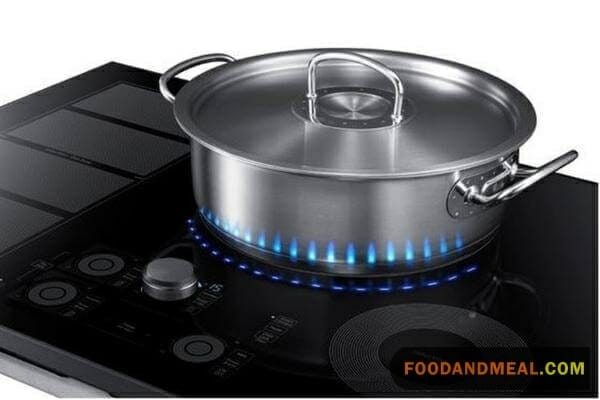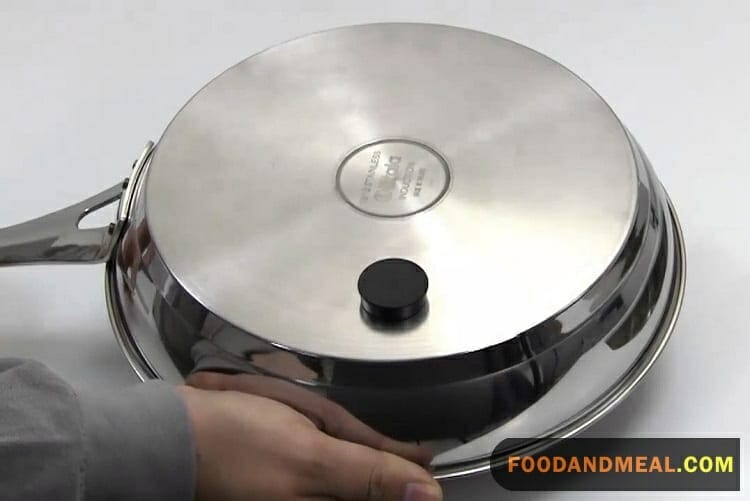Induction cooking has revolutionized kitchens by combining the best of gas and electric stoves. While it offers the precision of gas and the ease of cleaning of electric, it comes at a higher cost.
One question that arises is whether induction cookware can be used on gas stoves. To understand why you might choose induction cookware and its compatibility with non-induction cooktops, read on in this blog post “Can induction cookware be used on an electric stove” of Food and Meal!
Understanding the Distinction Between Induction Cookware and Conventional Cookware
Before deciding, it’s essential to grasp the fundamental differences between induction cookware and your typical cookware.
What sets induction cookware apart is the incorporation of a ferromagnetic element within the base of induction pots and pans. Apart from this base modification, the overall structure and design mirror that of regular cookware.
The primary advantage of induction cookware lies in its compatibility with induction stoves. However, if you have no intention of acquiring an induction stove, this cookware won’t provide any added benefits compared to its conventional counterpart.

What Is Induction Cooking?
Induction cooking diverges from traditional methods by employing magnetic induction rather than electric current or an open flame as the primary heat source. Despite this contrast in heating mechanisms, the cooking process remains essentially the same.
In an induction cooktop, a copper wire coil is integrated. When an alternating current passes through this coil, it transforms electrical energy into induction within the cooking vessel. This induction, in turn, generates a dynamic magnetic field, serving as the heat source for cooking food.
This magnetic field induces an eddy current within the cookware’s electrical resistance, consequently producing the heat required for cooking. This innovative process results in efficient and precise heating for your culinary endeavors.
Advantages Of Induction Cooking
Induction cookware has witnessed a meteoric rise in popularity, attracting an ever-growing multitude of enthusiasts for a host of compelling reasons. This culinary innovation isn’t merely a passing fad; it has fundamentally changed the way we approach cooking. Let’s delve into the myriad advantages of induction cooking that have prompted this widespread transition away from conventional cooking methods.
- Precise Temperature Control: Induction cooktops offer unparalleled precision when it comes to temperature control. Unlike gas or electric stoves, where the heating element may take some time to respond to adjustments, induction cookers instantly alter the heat output. This precision is particularly valuable for delicate dishes and recipes that require specific temperature settings.
- Efficiency: Induction cooking is exceptionally efficient, converting nearly all the energy it generates into heat. Traditional gas stoves can lose a significant amount of heat to the surrounding environment, whereas induction cooktops focus their energy directly on the cookware, resulting in faster cooking times and lower energy consumption.
- Safety: One of the standout features of induction cookware is its safety profile. Since the heat is generated only within the magnetic cookware, the surrounding surface remains relatively cool to the touch. This reduces the risk of burns and kitchen accidents, making it a safer choice, especially for households with children.
- Ease of Cleaning: Cleaning up after cooking is a breeze with induction cookware. Because the cooktop itself doesn’t get hot, spills and splatters are less likely to stick and burn onto the surface. This makes for quicker and easier cleaning compared to conventional stovetops.
- Energy Efficiency: Induction cooking is eco-friendly due to its energy efficiency. With faster cooking times and less heat loss, it reduces overall energy consumption and contributes to a greener, more sustainable kitchen.
- Uniform Heating: Induction cooktops provide even and consistent heating across the entire cooking surface. There are no hot spots or uneven flames to contend with, ensuring that your dishes are cooked uniformly every time.
- Quick Heating: Induction cookware heats up remarkably quickly. It’s as fast as a gas flame but without the open flame, making it ideal for those who value both speed and safety in their cooking.
- Modern Aesthetics: Induction cooktops boast sleek and modern designs that can complement any kitchen décor. Their flat, glass surfaces are not only stylish but also easy to integrate into various kitchen layouts.
- Cookware Versatility: While induction cookware typically requires specific magnetic pots and pans, these are readily available, and many households already own compatible cookware. This adaptability makes transitioning to induction cooking a smoother process.

Can Induction Cookware Be Used On An Electric Or Gas Stove?
Indeed, the answer to the question of whether induction cookware can be used on electric or gas stoves is a resounding YES!
As previously explained in this blog post, the key differentiator of induction cookware is the inclusion of a ferromagnetic unit in its base, while the rest of its structure and design closely resembles conventional cookware. This fundamental design allows induction cookware to be versatile enough for use on any type of stove, whether electric or gas.
This versatility has become one of the primary reasons why many individuals opt for induction cookware, even when they don’t possess an induction cooktop. In fact, a growing number of households that have both induction and non-induction stoves are transitioning to induction cookware due to its adaptability.
However, it’s essential to note that not all cookware is induction-compatible, but any induction-compatible cookware can be used on electric or gas cooktops without issue.
Nevertheless, there are two exceptions to this rule that warrant careful consideration:
| Thin Steel Base | If the base of the induction cookware is exceptionally thin, it may not perform optimally on electric or gas stoves. This will be elaborated on further in this blog post. |
| Non-Stick or Magnetic Coating | Induction cookware with an exterior that has been coated with a non-stick or magnetic layer may not be suitable for use on electric or gas stoves. The reasons behind this caution will be explored in greater detail later in this article. |
Stay tuned to gain a comprehensive understanding of these exceptions and how they affect the compatibility of induction cookware with different types of stovetops.
Will That Damage The Cookware?
In most cases, using induction cookware on a gas or electric stove does not cause immediate damage to the cookware itself. However, it’s important to understand the potential long-term effects and nuances associated with this practice.
Induction cookware is typically constructed by fusing a ferromagnetic unit with the rest of the cookware’s body through various manufacturing techniques. Often, a magnetic core is embedded into the base of the cookware. With repeated heating and cooling cycles during normal cooking use, the metal body and the magnetic core undergo different rates of contraction and expansion. Over time, this can lead to a gradual separation between the two components.
When the magnetic core becomes loosened, it may vibrate when exposed to heat, resulting in a noticeable ‘buzzing’ sound during cooking. While this buzzing doesn’t damage the cookware immediately, it can impact the overall cooking experience and become an annoyance.
However, it’s worth noting that there are induction cookware varieties designed with a magnetic layer that coats the entire cooking vessel. While these types of cookware tend to be more expensive, they eliminate the buzzing sound issue and maintain better long-term performance. This coating ensures a more secure bond between the magnetic component and the cookware’s body, minimizing any potential separation over time.
In summary, while using induction cookware on a gas or electric stove may not cause immediate harm, it’s essential to be aware of the long-term consequences, including the possibility of a buzzing sound. Investing in induction cookware specifically designed for versatile use across different cooktops can provide a quieter and more consistent cooking experience.

Why Should You Avoid It?
While it’s not forbidden to use induction cookware on gas or electric stoves, it’s generally advisable to avoid this practice for several compelling reasons, with the primary one being the prevention of the buzzing sound, which can be quite bothersome during cooking.
However, there are more critical reasons to exercise caution when using induction cookware on non-induction stovetops, particularly when:
- The Base is Too Thin: If the base of the induction cookware is exceptionally thin, exposing it to direct flame on a gas stove or electric heating element may cause issues. The differing rates of expansion and contraction between the thin base and the rest of the cookware can lead to warping or deformation over time.
- The Exterior is Coated with Non-Stick Material: This is a crucial concern. When induction cookware with a non-stick coating on its exterior is subjected to direct flame, there is a risk of producing harmful fumes. The non-stick layer typically contains chemicals that, when exposed to high heat, can release toxic compounds. These compounds may not only contaminate the food being cooked but also pose health hazards when inhaled.
FAQs
- Q: Is induction cookware compatible with electric stoves?
A: Generally, induction cookware is not compatible with standard electric stoves. Induction cookware is designed for induction cooktops, which require a specific magnetic interaction between the cookware and the induction surface.
- Q: What is the main difference between induction cookware and standard electric cookware?
A: The key difference lies in the material and construction. Induction cookware has a magnetic base that allows it to heat up through electromagnetic induction, while standard electric cookware heats up through direct contact with a heating element.
- Q: Can I use induction cookware on a coil electric stove?
A: No, induction cookware is not suitable for use on coil electric stoves. The coils require direct contact with the cookware for efficient heating, which is not possible with induction-compatible cookware.
- Q: How can I identify induction cookware?
A: Induction cookware typically has a magnetic base made of ferrous materials such as stainless steel or cast iron. To check for compatibility, use a magnet—if it sticks to the bottom, the cookware is likely suitable for induction.
- Q: What happens if I use induction cookware on an electric stove?
A: While the cookware may physically fit on an electric stove, it won’t heat up efficiently. The absence of the required magnetic interaction means the cookware won’t respond to the electromagnetic field generated by induction cooktops.
- Q: Can I modify induction cookware to make it compatible with an electric stove?
A: Modifying induction cookware is not recommended. The magnetic properties of the base are integral to the cookware’s performance, and altering them may compromise its functionality.
- Q: Are there adapters available to make induction cookware compatible with electric stoves?
A: Adapters to convert induction cookware for use on electric stoves are not widely available. It’s generally more practical to use cookware specifically designed for the type of stove or cooktop you have.
In summary, avoiding the use of induction cookware that is either too thin at the base or coated with non-stick material on gas stoves or electric stovetops is strongly recommended. This precaution is essential to prevent potential safety risks, ensure the longevity of your cookware, and maintain the health and safety of your cooking environment.

25 December ·
Exploring the Versatility of Induction Cookware: Can it be Used on an Electric Stove?
By Food And Meal
Welcome to our latest episode titled 'Exploring the Versatility of Induction Cookware: Can it be Used on an Electric Stove?' In this episode, we delve into the fascinating world of induction cookware, a unique type of cooking equipment that uses electromagnetic energy to heat food. We'll discuss its key characteristics, the best materials for induction cookware, and how it differs from regular cookware. But the burning question we'll address is - can you use induction cookware on an electric stove? Join us as we explore this topic, drawing on insights from various sources including Madeincookware.com, Reddit discussions, and expert advice from Consumer Reports. Let's get cooking!

